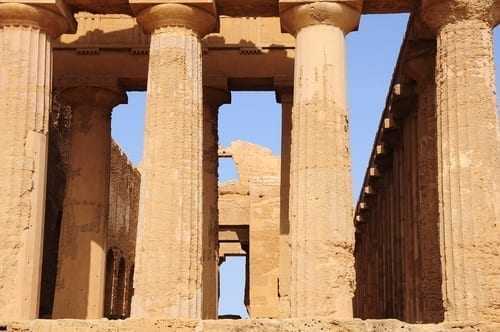Imagine a person wants to verify his credentials as a prophet. To prove his status as a prophet, he “prophesies” that the young man he is pointing at will marry in the future, give birth to children, and one of his children will go abroad at some stage of his life. If these things happen, should we conclude that he is a genuine prophet and his prophecy came true?
Of course not. The three details of his “prophecy” are common and entirely predictable (marriage, children, trip abroad for whatever reason). “Prophesying” that all these will happen entails a small risk and one can arrive at them just by guessing.
However, if the person would say instead: “All the children of this family will unwillingly go into exile abroad. They will first go to Egypt. The exiled family members will arrive in Egypt not through the usual continental route, but by ship, and there they will sell their belongings at a loss. They will then be forced to leave Egypt not because the Egyptians expelled them but because of a new nation that doesn’t exist yet, and whose language is still unknown. All the siblings will leave for a different country in the world. Life in all these new places will be very difficult, and they will overwhelmingly yearn for their home. I promise and guarantee that the day will come that they will return from all the corners of the world! Each one will have his own individual story of how he managed to return home. Not only that, but when they leave the Land of Israel, all the garden plants and flowerpots in their home will curl up and wither as if they are mourning the departure of the homeowners, and all the neighbors’ efforts to water them and revive them will end in failure. However, when the family members return from the corners of the earth to their home, the garden plants will amazingly bloom and all the flowerpots and flower boxes will blossom!”
In this case, if all the details occur exactly as predicted, we will relate to it completely different. It’s impossible to take a risk and guess so many details, especially when they are unpredictable and even illogical. 1. How can one know if all the children of that family will go abroad? 2. How can one know that they will all go to Egypt? 3. How can one know that they will arrive by sea and not another way? 4. How can one that their departure from Israel was coerced? 5. And by a new nation whose language is still unknown?? 6. How can one know that they will have to sell their belongings at a loss? 7. How can one know that they will be scattered among many countries? Maybe they will all settle together in their new place? 8. How can one know that they will return in the end? All of these developments are patently unpredictable! 9. What difference does it make to the plants who is taking care of them, and how does the one making this prediction know that they will “remain faithful” to the original homeowners?
In other words, a prediction for the future cannot be considered a prophecy — even if it is fulfilled — unless it includes unpredictable and illogical details which absolutely cannot be foreseen in advance by an intelligent guess. The more the details of the prophecy will be strange, absurd and paradoxical, the more their fulfillment proves the truth of the prophet and his prophecy.
One who peruses the Torah’s prophecies discovers to his surprise that the above-mentioned prediction pales next to the complexity and “bizarreness” of the details which appear in many of these prophesies. Those powerful prophecies, which are spread out over many generations, include many absurd and paradoxical components which completely negate the likelihood or possibility that they would happen in a natural, normal process, and therefore could not be guessed in advance. Despite this, the details of these prophecies were com-pletely fulfilled, step after step, generation after generation.
***
Two difficult prophecies dealing with the destruction of the Land of Israel and the people’s exile from their land appear in the Torah. One is in the Torah section of Bechukotai in the Book of Leviticus, and the second is in Ki Tavo which appears in the Book of Deuteronomy.
A superficial reading of these two prophecies gives us the feeling that they are similar, and we may even wonder why they were written twice. But one who studies the words that appear in these places in detail, notices dozens (!) of slight differences which create two completely different pictures. An historical review reveals, amazingly, that each one of them dealt with a completely different period. The first section matches perfectly — according to the testimony of historians — what occurred in the period of the First Temple’s destruction and the subsequent exile, while the second section is a perfect match to what occurred in the period of the Second Temple’s destruction, and the exile that followed it! In this article we will investigate the accuracy of the first prophecy relating to the First Temple period.
The First Exile: Events and Characteristics
Let us free ourselves for a moment from the perspective of two thousand years of exile, and try to feel how a Jerusalem resident in the Land of Israel felt during the period of the Israelite kingdom.
He sees the mansions of Jerusalem’s elites outside of his window, with the king’s palace especially striking in its beauty. Not far away, on top of the Temple Mount, stands the magnificent Temple in all its glory, with its beautiful, strong and smooth courtyard walls surrounding it on all four sides (without the holes and the shrubs growing out of the stones as we see in the Wailing Wall’s stones, the remnant of the Destruction). The Jewish people dwells only in the Land of Israel.
We take a seat next to the table, we unroll a Torah parchment containing verses which were given to our people not long ago, and we read:
“If you follow My statutes and observe My commandments and perform them, I will give [blessing]…” (Lev. 26:3-4)
“But if you do not listen to Me and do not perform all these commandments, and if you despise My statutes and reject My ordinances, not performing any of My commandments and breaking My covenant, then I too will do the same to you; I will order upon you… (1) I will lay your cities waste and (2) make your holy places desolate, (3) I will make the Land desolate, so that it will become desolate [also] of your enemies who live in it. (4) And I will scatter you among the nations, and (5) I will unsheathe the sword after you.” (Lev. 14-33)
We have 5 prophecies here:
1. Jewish cities with their magnificent houses and mansions will be demolished.
2. The Temple will be utterly destroyed.
3. Our enemies who will conquer the land will not succeed in making it bloom anew, even though they are dwelling on it (it will be desolate [also] when your enemies live in it). The land will maintain its faith with us. (This can be compared to a father who punishes his son by taking away his private bedroom. He nevertheless informs him that the bedroom will not be given to anyone else, but will remain empty until the beloved son is worthy of returning to it).
4. When in exile, we will not remain in one country, but will be scattered among the nations. (During the First Exile, Jews were also scattered among the nations, as Haman told Achash-verosh during that period [Esther 3:8] “there is one people who is scattered and separate among the nations in every country.“)
5 . While they are scattered around the world, they will not find rest but the sword will pursue them. (Chananya, Mishael and Azariah were thrown in a fiery furnace, Daniel was put in a lion's den, Haman decreed to murder all the Jews, etc.(
How must these words have sounded during the period of the Israelite kingdom, before the Destruction of the First Temple?
How do they sound with hindsight, after they already took place?
* * *
The Years of the First Exile
How long did the first exile last? Did someone predict in advance and guarantee that this is what would happen??
Let’s return to the above-mentioned verses and contemplate them and the verses that follow them:
“But if you do not listen to Me and do not perform all these commandments, and if you despise My statutes and reject My ordinances, not performing any of My commandments… I will order upon you…And I will scatter you among the nations, and I will unsheathe the sword after you. Your land will be desolate, and your cities will be laid waste. Then, the land will be appeased regarding its sabbatical years. During all the days that it remains desolate while you are in the land of your enemies, the Land will rest and thus appease its sabbatical years. It will rest during all the days that it remains desolate, whatever it had not rested on your sabbatical years when you lived upon it.” (Lev. 26:14-35)
The Torah declares even before the Israelites have entered the Land of Israel: If after you come to the land you don’t perform My commandments, including the commandment of letting the land rest (during the seventh sabbatical year, and during the Jubilee year; for the details of these laws, see Leviticus Chapter 25), you will not have the privilege to continue living in the Land of Israel, and you will be forced to leave the land for the number of years which parallel the number of years when the land should have rested, but which you didn’t observe according to law. So against your will, the land will rest from being worked while you are suffering in exile, in place of those years when you should have let it rest from work out of your own free will.
Now, a calculation of the sabbatical and Jubilee years in the period when these command-ments of the Torah were not kept in the Land of Israel from the beginning of this period until the year of the First Temple’s Destruction and Israel’s exile from its land, gives us 70 years [the exact, detailed calculation is explained in Rashi’s commentary in Lev. 25:35].
Indeed, when the Jewish nation went into exile, G-d commanded Jeremiah the prophet to send a letter to the exiles in Babylonia:
“And these are the words of the scroll that Jeremiah the prophet sent from Jerusalem to the remaining elders of the exile and to the priests and to the prophets and to all the people that Nebuchadnezzar had exiled from Jerusalem to Babylon.” (Jer. 29:1)
In the letter he declares:
“For so said the L-rd: For at the completion of seventy years of Babylon, I will remember you, and I will fulfill My good word toward you, to restore you to this place.” (Jer. 29:10)
“And in the first year of Cyrus, the king of Persia… the L-rd aroused the spirit of Cyrus, the king of Persia, and he issued a proclamation throughout his kingdom, and also in writing, saying: “So said Cyrus, the king of Persia, Who is among you of all His people, may his G-d be with him, and he may ascend to Jerusalem, which is in Judea, and let him build the House of the L-rd, G-d of Israel; He is the G-d Who is in Jerusalem.” (Ezra 1:1-3(
Ezra testifies that at the end of the time which G-d had announced through Jeremiah, Cyrus the king of Persia, the ruler of the Land of Israel, was suddenly and inexplicably aroused to encourage the exiles to return. There is no way to understand it other than the fact that it was the Creator’s Will. He permitted the exiles to return to their land, renew their spiritual center and rebuild the Temple.
Indeed, the Book of Chronicles which concludes the history of the Biblical period, (and which was written and published immediately after the Babylonian exiles had returned to their land), describes the Destruction and then mentions the entire period of exile, while unequivocally referring to Jeremiah’s prophecy. Here are its words:
“And they burned the House of G-d G-d, and they demolished the wall of Jerusalem, and all its palaces they burned with fire… And he exiled the survivors of the sword to Babylon… until the reign of the kingdom of Persia. To fulfill the word of the L-rd in the mouth of Jeremiah, until the land was appeased for its Shabbats; [for] it rested all the days of its desolation until seventy years were completed. (Chronicles II 36:19:21)
It is worthwhile pointing out that the various historians and researchers do not dispute the fact that the exile lasted for 70 years. (The miracle of Purim occurred during those 70 years of exile, after Achashverosh had ascended the throne after Cyrus and Darius. The latter had conquered Babylonia during the reign of Belshazzar, the second son of Nebuchadnezzar, king of Babylonia, the destroyer of the First Temple.)[1]
[1] The prophecy about the end of Babylonia was also completely fulfilled as predicted in Isaiah (13:19): “And Babylon, the beauty of the kingdoms, the glory of the pride of the Chaldeans, shall be like G-d 's overturning of Sodom and Gemorrah. It shall forever be uninhabited, and no one shall dwell there from generation to generation…” (See more about the Destruction of Babylonia in Jeremiah’s prophecy [Chapters 50-51]!) Here is a quote from the book “Journey to the Summit of Mount Sinai” (page 63) about this:
“Had the prophets promised us that Babylonia would be destroyed without mention-ing a specific date, their words would have been risk-free. However, this prophecy is not just a boilerplate prophecy of destruction, it is an unambiguous promise that after Babylonia will be destroyed — which occurred shortly after the prophecy was delivered — and no person will succeed in rebuilding it for eternity! Which person dares to talk about an eternity? How can a human being know what the hidden future holds? To ensure that this prophecy will materialize, a human would have to guard the ruins forever to insure that no person dares to attempt rebuilding them!
In our times, due to our advanced technology and the relative ease with which infrastructure can be built, cities that were destroyed — whether in war or by natural disasters — were rebuilt again in the same place as the original cities. Even Hiroshima that had absorbed fatal levels of radiation, and logic dictated not rebuilding a city in the same contaminated place, was nevertheless rebuilt there.
This should have been even more true in the ancient period, when it was far more difficult to build a city infrastructure. In many archaeological excavations of ancient cities, they have discovered numerous layers including layers showing a conflagration that visited the city. This phenomenon teaches us that cities that were destroyed were rebuilt time after time in the same place.
To prophesy that a certain city would be destroyed and would never be rebuilt, was therefore taking a huge risk! The chance that such a prophecy would materialize was extremely low, particularly taking in consideration the fact that the prophecy had to hold true for all times, and throughout history… until the end of all generations. Forever! Who could predict such a thing about a city like Babylonia, the center of the Babylonian empire, who so many conquerors dreamed to rebuild as their capital and rule their kingdom from it, out of a desire to be the successor of the famous Nebuchadnezzar? Alexander of Macedonia wanted to turn it into the capital of his extensive empire, but he died before realizing his dream. Immediately afterwards, his empire split apart and the plan was dropped. Babylonia was a famous, much-coveted city, yet Jeremiah and Isaiah prophesied about it that “It shall forever be uninhabited!”
The Bible Encyclopedia writes these few sentences about Babylonia (city): “There is nothing left of this city, which was the capital of various empires during the second and first millennia before the Common Era, besides a wide field of ruins on the eastern side of the Euphrates…”
Dr. Pinchas Biberfeld in his book Ancient Jewish History writes: “After the reign of Cyrus, Babylonia still continued to be an important city, remaining one of the capitals of the Persian empire. But gradually the city became more and more deserted. Alexander the Great intended to make it the center of his world empire, but his sudden death prevented this. And Babylon eventually passed from the scene. It was reduced to rubble and remained in this condition until our time as a constant witness to the truth of the predictions of the Hebrew prophets.”





